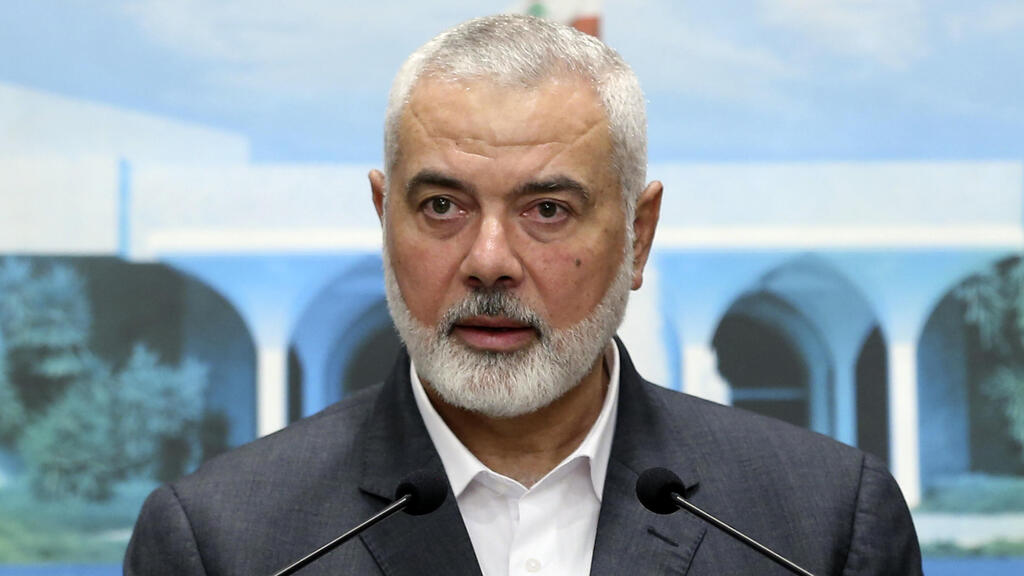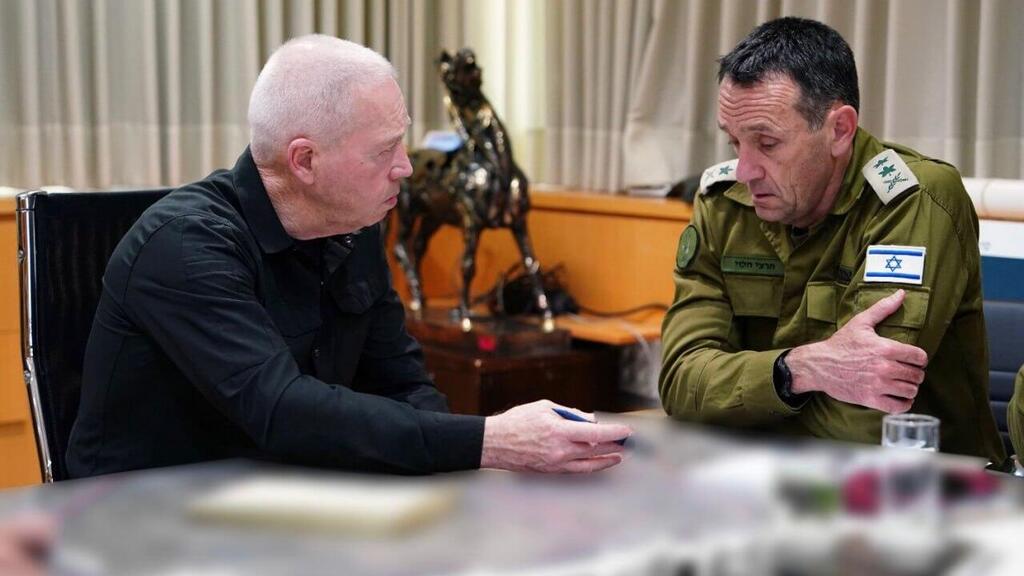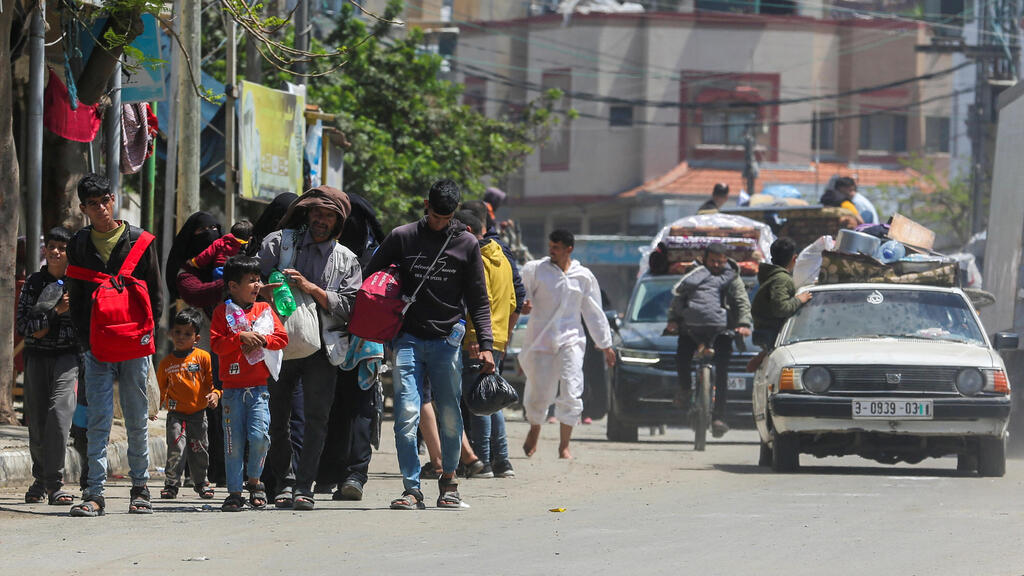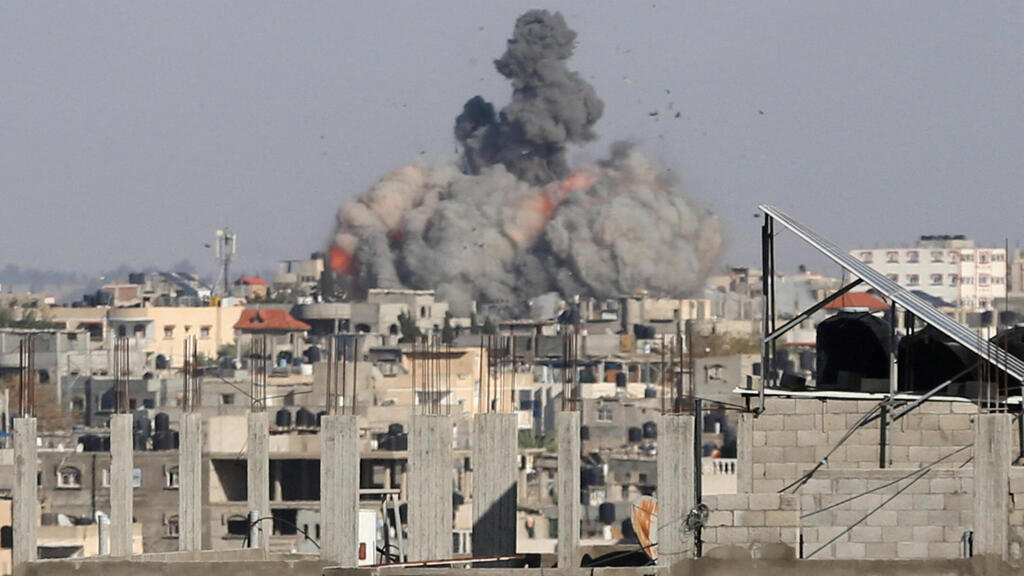Hamas announced Monday it has accepted an Egyptian-Qatari proposal for a cease-fire to halt the seven-month-long war with Israel in Gaza, hours after Israel ordered about 100,000 Palestinians to begin evacuating from the southern city of Rafah, signaling that a long-promised ground invasion there could be imminent. A Hamas official said that "we agreed to a six-week cease-fire."
A senior Israeli official called the so-called deal "a unilateral proposal without Israeli involvement. This is not the proposal we discussed with the Egyptians. This is an exercise by Hamas designed to present Israel as a refusenik."
Israeli officials added that "the Egyptians unilaterally flexed all the parameters so that Hamas would agree. This was done unilaterally and this proposal is not acceptable to Israel." According to an Israeli official, "it sounds like a drill."
4 View gallery


Hamas Political chief Ismail Haniyeh announced that Hamas has accepted the Egyptian-Qatari cease-fire proposal
(Photo: Turkish Presidential Press Office/Handout via REUTERS ,Dalati Nohra/Lebanese Official Government via AP)
Later on Sunday evening, in a statement to the media, IDF spokesman Brigadier General Daniel Hagari referred to the announcement by Hamas accepting the proposed cease-fire, and said: "We are examining every answer very seriously, and exhaust every possibility regarding negotiations and the return of the hostages to their homes as quickly as possible as a concentrated task. At the same time, we continue to operate in the Gaza Strip and will continue to do so."
Reuters also later reported that Hamas agreed to the latest proposal that Israel had made on April 27 and there were no major changes since then, citing an official briefed on the cease-fire talks, who added that Qatari mediators had spoken to Hamas about this on Sunday and Monday. "What happens next depends on Israel to accept or reject Hamas' response. The ball is in Israel's court," the source told Reuters, asking not to be identified because of the sensitivity of the matter.
The United States is studying Hamas' response to a cease-fire proposal and will discuss it with allies in the Middle East in the coming hours, State Department spokesperson Matthew Miller told reporters on Monday after the Hamas response. "I can confirm that Hamas has issued a response. We are reviewing that response now and discussing it with our partners in the region," Miller said on Monday afternoon, confirming that a response was received and that discussions would take place in the coming hours. CIA director Bill Burns is in the region "working on this in real time," Miller said.
An Israeli official said later on Monday that "the security establishment is currently studying the Hamas proposal in depth. On the face of it, it seems that there is a demand for an end to the war that we cannot accept." According to him, "the end of the war remains something concrete and they are not giving up on it. At the moment preparations for the operation in Rafah continue as usual."
Hamas political head Ismail Haniyeh on Monday evening informed the Prime Minister of Qatar and the Egyptian Minister of Intelligence that the terror group. At the same time, a statement came out of the Defense Minister's office reporting that Yoav Gallant and IDF Chief of Staff Herzi Halevi "approved operational plans" for Rafah.
This is a particularly dramatic message, given in the shadow of Israel's preparations to enter Rafah and the start of the evacuation of civilians from parts of the city. Israeli military leaflets were dropped Monday with maps detailing a number of eastern neighborhoods of Rafah to evacuate, warning that an attack was imminent and anyone who stays “puts themselves and their family members in danger.” Text messages and radio broadcasts repeated the message.
On Sunday, it was reported that the talks were "on the bring of explosion," and the head of the CIA, William Burns, flew to Qatar in a panic from Cairo, and it was reported that he would also arrive in Israel.
The President of the United States, Joe Biden, spoke by phone shortly before the Hamas announcement with Prime Minister Benjamin Netanyahu , and told him, according to reports, that a cease-fire is "the best way to save the lives of the hostages."
Defense Minister Yoav Gallant met earlier on Monday with the families of hostages held captive by Hamas in Gaza, and told them that "operations to repatriate their loved ones continue all the time, even at this time. We are committed to achieving the goals of the war, but Hamas' refusal of any proposal that would allow the repatriation of the hostages obliges us to begin the operation in Rafah." According to Gallant: "In every decision we make – operational or political, the mission of returning the hostages is at the forefront. Even after the start of the operation in Rafah, all efforts to return the hostages will continue.
Tensions escalated Sunday when Hamas fired rockets at Israeli troops positioned on the border with Gaza near Israel’s main crossing for delivering humanitarian aid, killing four soldiers. Israel shuttered the crossing
In a fiery speech Sunday evening marking Israel’s Holocaust memorial day, Netanyahu rejected international pressure to halt the war, saying that “if Israel is forced to stand alone, Israel will stand alone.”
This is what is known about the proposal
As far as is known so far, according to the proposal on the table - which according to Israel has been modified - in the first stage, which will last 40 days, there will be a temporary cease-fire between the parties and the IDF will withdraw eastward from densely populated areas in the Gaza Strip, to an area close to the Israeli border. In addition, it was reported, there will be a suspension of flights over the Gaza Strip for 8 hours a day, and 10 hours on hostage release days. There will also be an increase in the introduction of humanitarian aid and fuel into the Gaza Strip.
According to the proposal, in the first phase Hamas will release three hostages on the first day of the agreement, and then three hostages every three days, until the 33rd day. By the seventh day (at most), it was reported, Hamas will submit a list of all the remaining hostages from specific categories (women, children, elderly and sick), provided that they are released on the 34th day. With the agreement to cease military operations, the truce will be extended by several days depending on the number of hostages remaining (an additional day for each hostage to be released). In exchange, Israel will release an identical and agreed upon number of Palestinian prisoners according to the lists that will be agreed upon.
It was also reported that, no later than the 16th day of the first phase, indirect discussions will begin between the parties regarding an agreement on the arrangements required to restore "sustainable peace" in the Strip. At this stage, the international organizations and the UN will begin providing humanitarian services in the entire Gaza Strip, and in the restoration of the infrastructure (electricity, water, sanitation, communication and roads) in the entire Gaza Strip.
This section also states that there will be an easing of the introduction of supplies and aid needed to establish camps to accommodate displaced persons who lost their homes during the war, and that starting on the 14th day, an agreed number of wounded "military personnel" (terrorists) will be allowed to pass through the Rafah crossing to receive medical treatment.
As for the return of the displaced persons to their homes, the proposal states that "on the seventh day (after the release of all the women), Israeli forces will withdraw from Al-Rashid Street eastward along Salah al-Din Street, in a way that allows the entry of humanitarian aid, the beginning of the return of unarmed displaced citizens to their areas of residence and freedom of movement of the civilian population in all areas of the Strip. On the 22nd day, after the release of two-thirds of the hostages according to the version of the published proposal, "Israeli forces will withdraw from the center of the Gaza Strip (mainly from the Netzerarim Corridor and Kuwait Square), east of the Salah al-Din road, to an area near the border, where displaced citizens may return to their places of residence in the northern Gaza Strip.
4 View gallery


Defense MInister Yoav Gallant and IDF Chief of Staff Herzi Halevy finalize plans for Rafah invasion
(Photo: Ariel Harmoni, Ministry of Defense)
The wording of the proposal also refers to the issue of humanitarian aid: "Facilitating the entry of intensive and appropriate amounts of humanitarian aid, aid materials and fuel (500 trucks, of which 50 are fuel trucks, with 250 arriving in the northern Gaza Strip), including the fuel needed to operate power stations, and the equipment needed for clearing rubble and reconstruction of hospitals, health centers and bakeries in all areas of the Gaza Strip." This section, according to the report, will continue throughout all stages of the agreement.
In the second phase, which will last 42 days, the necessary arrangements will be completed to restore "sustainable peace" in the Gaza Strip, and the announcement of its entry into force before the beginning of a prisoner exchange between the parties - when Israel will receive all the surviving male hostages (civilians and soldiers over the age of 19 which will be all the remaining hostages), in exchange for an agreed number of Palestinian prisoners and also a "full withdrawal" of the IDF from the Gaza Strip.
Hamas said that they are interested in Israel expressing its readiness for a "full withdrawal" in the second stage, and not a "gradual withdrawal," along with "a willingness to return all displaced persons without Israeli opposition and to provide adequate guarantees for a cease-fire."
In the third phase, which will also last 42 days, the bodies of the Israelis in the Strip will be exchanged for the bodies of Palestinian terrorists after identification. In addition, a five-year reconstruction plan for the Strip will begin, which will include the construction of houses, civil facilities and infrastructure.
First published: 20:35, 05.06.24



